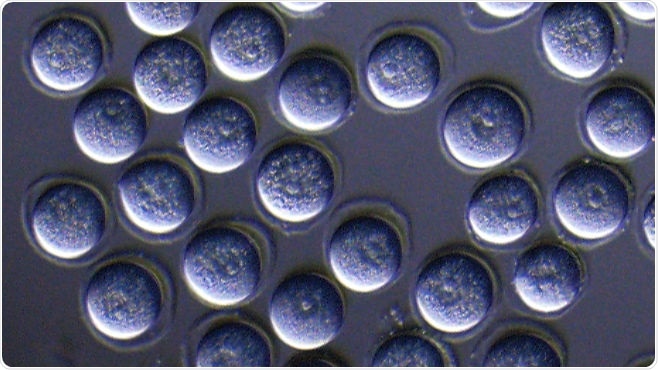Researchers in Japan have demonstrated that activating just eight genes is enough to induce the stem cells of mice to transform into oocyte-like cells that mature and eventually can be fertilized. The team presents a new tool that could be invaluable in reproductive biology and medicine, although further research is needed to reproduce these results in human cells.

Oocyte Cells. Image Credit: Kyushu University
The uniqueness of oocytes
An oocyte is considered to be the beginning of human life. It is a cell that is destined to become a human egg cell. These cells are unique because they have the power to differentiate into more than two hundred types of cells that make up the human body. Scientists believe the substances present within the oocyte’s cytoplasm are essential to this unique ability.
Given the importance and uniqueness of oocytes, much research has been conducted over the years to explore their function and capabilities. Back in the 1990s, scientists replaced the nucleus of an oocyte with that found in a cell in the body, a method known as somatic cell nuclear transfer, which resulted in the birth of a clone - Dolly the sheep. This study, and those that followed, have shaped our understanding of how life is created and has helped to further the field of reproductive medicine.
In a new study published this month in the journal, Nature, a team of scientists in Japan presents the findings of their study which aimed to further our understanding of oocytes by uncovering the genes that are implicated in oocyte development.
The team report that the activation of just eight genes is all that is required to convert stem cells obtained from mice into oocyte-like cells that once matured can be fertilized just like egg cells.
Eight transcription factors lead to big changes
Led by Katsuhiko Hayashi, professor at Kyushu University's Faculty of Medical Sciences, the Japan-based team analyzed the development of oocytes taken from mice. Through their analysis, they were able to determine which specific genes are involving in triggering the synthesis of the proteins (transcription factors) necessary for oocyte growth as well as converting stem cells into oocyte-like cells. In total, the evidence collected revealed that just eight genes were implicated in this process.
The paper’s first author and assistant professor at Kyushu University, Nobuhiko Hamazaki, summarizes the team’s surprise at finding such a small number of genes are required to convert stem cells into oocyte-like cells.
I was initially in complete disbelief to see mouse stem cells so quickly and easily take the form of oocytes based on introducing just a handful of factors, but repeated experiments proved it was true, to find that eight transcription factors could lead to such big changes was quite astonishing.”
The team, who worked alongside researchers at RIKEN, concluded that mouse embryonic stem cells, as well as induced pluripotent stem (iPS), cells consistently transformed into oocyte-like cells when they were induced to produce eight specific transcription factors.
The researchers found that when the cells were grown surrounded by types of cells that usually accompany oocytes, the induced oocyte-like cells began converting into cells that resembled mature egg cells. The team showed that these cells were viable, and could be fertilized in vitro.
While the oocyte-like cells may not be feasible to use in the long run, the study presents a methodology that will undoubtedly be useful in applications requiring mainly the oocyte cytoplasm. Research into reproductive biology will likely benefit greatly from this advancement, as well as studies into mitochondrial replacement therapy.
cytoplasm from oocytes is an invaluable resource in reproductive biology and medicine, and this method could provide a novel tool for producing large amounts of it without any invasive procedures”.